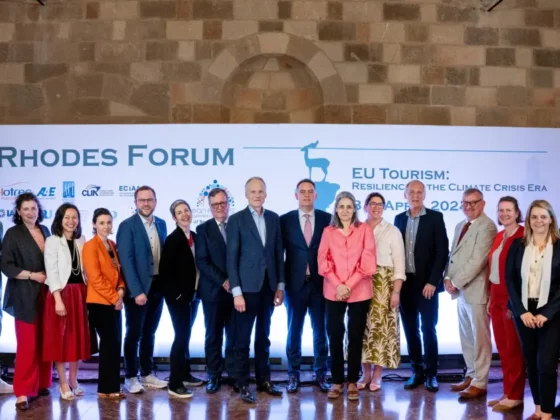
The signing of the adherence at the FITUR international tourism trade fair in Madrid marks a significant step in reinforcing the global commitment to enhancing travellers’ rights and protections worldwide.
Today, we reaffirm our commitment to supporting Andorra in achieving balanced, sustainable, and competitive tourism growth on the global stage. The challenges the sector faces, including climate change and resource stability, demand strengthened institutional collaboration. By promoting sustainable practices and driving innovative solutions, we can ensure Andorra remains a resilient top destination for the future. Natalia Bayona, Executive Director of UN Tourism
The Minister of Tourism and Commerce of Andorra, Jordi Torres Falcó, expressed his enthusiasm, stating, Joining the ICPT reaffirms Andorra’s commitment to responsible and sustainable tourism, aimed at benefiting both travellers and residents.
In addition to this significant milestone, UN Tourism is launching a technical cooperation project focused on developing a Tourism Framework Law for Andorra. This initiative addresses the key needs of the sector by creating a comprehensive legal framework that integrates best international practices in sustainable tourism, placing special emphasis on the core pillars of sustainability, digitalization, training, and sector competitiveness.
The project will also guide tourism governance in Andorra, establishing essential inter-institutional and multisectoral coordination mechanisms to ensure the effective implementation of a strategic tourism plan in the coming years.
By fostering collaboration among key stakeholders and offering specialized support, this project aims to foster a Tourism Framework Law that combines international best practices with local needs, ensuring sustainable, competitive, and responsible tourism growth in the country.
Alicia Gomez, Director of Legal Affairs and International Standards at UN Tourism, emphasized the importance of this achievement: I would like to thank Minister Torres for placing his trust in UN Tourism to develop this technical cooperation project, which will provide the country with a comprehensive, updated, and harmonized legal framework, driving flexible and effective long-term growth in the tourism sector and serving as a reference framework for other member states in the development and optimization of tourism legislation.
Related links
About UN Tourism
The World Tourism Organization (UN Tourism) is the United Nations agency responsible for the promotion of responsible, sustainable and universally accessible tourism.
As the leading international organization in the field of tourism, UN Tourism promotes tourism as a driver of economic growth, inclusive development and environmental sustainability and offers leadership and support to the sector in advancing knowledge and tourism policies worldwide.
Our Priorities
Mainstreaming tourism in the global agenda: Advocating the value of tourism as a driver of socio-economic growth and development, its inclusion as a priority in national and international policies and the need to create a level playing field for the sector to develop and prosper.
Promoting sustainable tourism development: Supporting sustainable tourism policies and practices: policies which make optimal use of environmental resources, respect the socio-cultural authenticity of host communities and provide socio-economic benefits for all.
Fostering knowledge, education and capacity building: Supporting countries to assess and address their needs in education and training, as well as providing networks for knowledge creation and exchange.
Improving tourism competitiveness: Improving UN Tourism Members’ competitiveness through knowledge creation and exchange, human resources development and the promotion of excellence in areas such as policy planning, statistics and market trends, sustainable tourism development, marketing and promotion, product development and risk and crisis management.
Advancing tourism’s contribution to poverty reduction and development: Maximizing the contribution of tourism to poverty reduction and achieving the SDGs by making tourism work as a tool for development and promoting the inclusion of tourism in the development agenda.
Building partnerships: Engaging with the private sector, regional and local tourism organizations, academia and research institutions, civil society and the UN system to build a more sustainable, responsible and competitive tourism sector.
Our Structure
Members: An intergovernmental organization, UN Tourism has 160 Member States, 6 Associate Members, 2 Observers and over 500 Affiliate Members.
Organs: The General Assembly is the supreme organ of the Organization. The Executive Council take all measures, in consultation with the Secretary-General, for the implementation of the decisions and recommendations of the General Assembly and reports to the Assembly.
Secretariat: UN Tourism headquarters are based in Madrid, Spain. The Secretariat is led by the Secretary-General and organized into departments covering issues such as sustainability, education, tourism trends and marketing, sustainable development, statistics and the Tourism Satellite Account (TSA), destination management, ethics and risk and crisis management. The Technical Cooperation and Silk Road Department carries out development projects in over 100 countries worldwide, while the Regional Departments for Africa, the Americas, Asia and the Pacific, Europe and the Middle East serve as the link between UN Tourism and its 160 Member States. The Affiliate Members Department represents UN Tourism’s 500 plus Affiliate members.
UN Tourism Communications Department
+34 91 567 8100
UN Tourism








